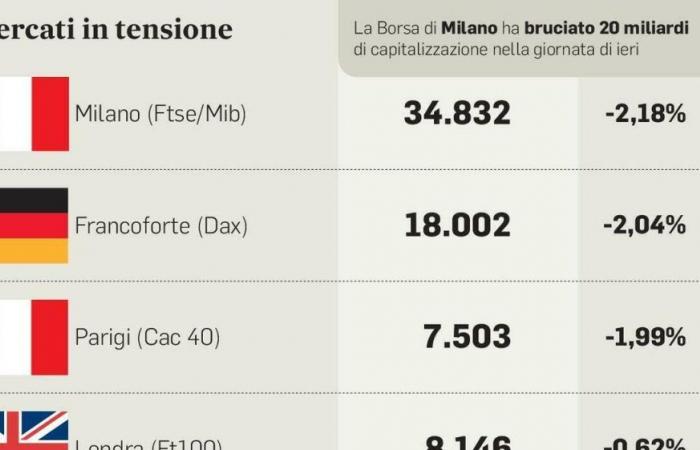Marine Le Pen effect on European stock markets, Milan alone burned 20 billion. After President Emmanuel Macron’s decision to call early elections on June 30, following the outcome of the vote that favored the right, the markets fear the risk of a surge in populist forces. And this eventuality has generated shocks on the price lists and fuels a tension that is released on the spread, which is rising again. After an attempted recovery at the start of the session, the price lists all closed in negative, with the Paris Cac 40 canceling out the year’s gains (-0.5% from the beginning of 2024) closing at -2.66% ( -6.2% since the beginning of the week), Frankfurt (Dax 40) achieved -1.44%. Even Piazza Affari was unable to get back on track, stuck below 34,000 points, a level regained at the beginning of May, until trading ended with a decline of 2.81% (-5.8 from last Monday) (32,665 points). The market tensions were released as always happens on the spread which closed up by 6.32% to 155 points. “We must be prepared for a world with new risks,” commented Christine Lagarde, almost as if wanting to defuse fear.
Why did Piazza Affari drop 2.8%? The weight of financial securities and the fear of debt, what is happening
UNCERTAINTY
What worries investors is not only the electoral results themselves: the advance of anti-European forces was widely expected and according to more than one analyst, in fact, it did not reach such proportions as to alter the political balance in Strasbourg and Brussels, but it he believes that the uncertainty that has been created in one of Europe’s leading countries such as France, which is putting the axis with Germany in crisis, weighs heavily. The success of Le Pen’s party which polarizes politics in Paris is contrasted by the pact of the left: the New Popular Front, an alliance between the Socialist Party, the Communist Party, the French Greens and Jean-Luc Mélenchon’s La France Insoumise, which he presented a program that aims to cancel most of Macron’s economic reforms (reduction of the retirement age, support for the weaker classes on the spending side, less so on the revenue side) and to reject the European Stability Pact. However, investors have many doubts about the country’s stability and deficit, and consequently about the stability of the euro itself.
According to many optimistic investors, volatility could reduce on July 7, the date of the second round of the French consultations which may not confirm the extent of the advance of the right. «We believe that the elections in France in the next few weeks have become a very significant event for the financial markets», comment the analysts of Ig Italia, highlighting the surge in European spreads, «especially the French Oat-Bund spread, which has reached exceed 75 on 2017 levels, when fears of a Frexit were very real.” In the meantime, the stock market and government bonds could travel on the roller coaster, yesterday Piazza Affari wore the “black shirt” with a drop of 2.18%, sliding to the lowest level for almost two months.
THE TWO HORNS
Why has Milan lost more in Europe despite having a more stable political structure? There are essentially two reasons, as qualified analysts agree. The first. The composition of the index records a predominant presence of financial stocks, therefore also banking: it is equal to 39% of Piazza Affari. This is why Unicredit lost 5.55%, Bper – 3.96%, Nexi -3.55%, Mps -3.45, Banco Bpm -2.87%. At a sector level, in addition to banking, industrial, construction and luxury suffered the largest declines, while consumer goods showed greater resilience, followed by defensives such as telephones, food and pharmaceuticals.
The second cause of Milan’s collapse could be the public debt crisis which has risen to 2,905 billion. And debt is heavily influenced by the European and French political framework where, among other things, attention is focused on issues such as immigration which have a direct impact on debt dynamics, especially on fragile countries such as Italy. Markets also fear a situation similar to that in the United Kingdom when an excessive budget in terms of spending caused shocks in the market until the resignation of former Prime Minister Liz Truss.
© ALL RIGHTS RESERVED
© ALL RIGHTS RESERVED






